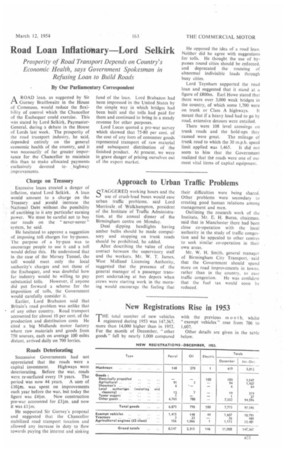Road Loan Inflationary—Lord Selkirk
Page 55

If you've noticed an error in this article please click here to report it so we can fix it.
Prosperity of Road Transport Depends on Country's Economic Health, says Government Spokesman in Refusing Loan to Build Roads
By Our Parliamentary Correspondent AROAD loan, as suggested by Sir Gurney Braithwaite in the House of Commons, would reduce the flexibility of control which the Chancellor of the Exchequer could exercise. This was stated by Lord Selkirk, PaymasterGeneral, during a debate in the House of Lords last week. The prosperity of the road transport industry, he said, depended entirely on the general economic health of the country, and it was necessarily of far greater importance for the Chancellor to maintain this than to make allocated payments exclusively devoted to. highway improvements.
Charge on Treasury
Excessive loans created a danger of inflation, stated Lord Selkirk. A loan would amount to a charge on the Treasury and would increase the National Debt without the possibility of ascribing to it any particular earning power. We must be careful not to buy our roads on the "never-never" system, he said.
He hesitated to approve a suggestion of imposing toll charges for by-passes. The purpose of a by-pass was to encourage people to use it and a toll would defeat this. He understood that in theease of the Mersey Tunnel, the toll would meet only the local authority's charges and not those of the Exchequer, and was doubtful how far industry would be willing to pay substantial tolls. However, if anyone did put forward a scheme for the imposition of tolls, the Government would carefully consider it.
-Earlier, Lord Brabazon said that Britain's road problem was unlike that of any other country. Road transport accounted for almost 10 per cent, of the production and distribution costs He cited a big Midlands motor factory where raw materials and goods from 750 sources, each on average 100 miles distant, arrived daily on 700 lorries.
Roads Deteriorating
Successive Governments had not appreciated that the roads were a capital investment. Highways were deteriorating. Before the war, roads were re-surfaced every 19 years. The period was now 44 years. A sum of f10fm, was spent on improvements each year before the war, but today the figure was £4m. New construction pre-war accounted for inm. and now it was Ellin.
He supported Sir Gurney's proposal and suggested that the Chancellor stabilized road transport taxation and allowed any increase in duty to flow towards paying the interest and sinking fund of the loan. Lord Brabazon had been impressed in the United States by the simple way in which bridges had been built and the tolls had paid for them and continued to bring in a steady revenue for other purposes.
Lord Lucas quoted a pre-war survey which showed that 75-80 per cent, of the cost of any item of consumer goods represented transport of raw material and subsequent distribution of the finished product. At present, we were in grave danger of pricing ourselves out of the export market. He opposed the idea of a road loan. Neither did he agree with suggestions for tolls. He thought the use of bypasses round cities should be enforced. and deprecated the routeing of abnormal indivisible loads through busy cities.
Lord Teynham supported the road Loan and suggested that it stand at a figure of £800m. Earl Howe stated that there were over 3,000 weak bridges in the country, of which some 1,700 were on trunk or Class A highways. It meant that if a heavy load had to go by road, extensive detours were entailed.
There were 108 level crossings on trunk roads and the hold-ups they caused were great. The mileage of trunk road to which the 30 m.p.h. speed limit applied was 1,465. It did not seem to him that the Government realized that the roads were one of out most vital items of capital equipment.




































































































